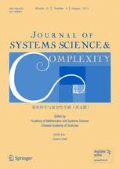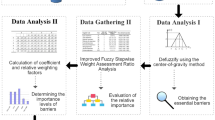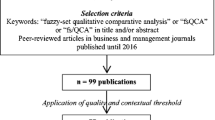Abstract
The Global Entrepreneurship and Development Institute annually publishes the Global Entrepreneurship Index (GEI) to show entrepreneurship of each country/area. The GEI is obtained by averaging the scores of three sub-indexes, entrepreneurial attitudes, entrepreneurial abilities and Entrepreneurial aspirations. However, this GEI construction method with equal weights for three subindexes may be controversial, since the relative importance among the three sub-indexes may vary across countries and areas due to economic and social/cultural reasons. This study comprehensively considers all possible weights, and formulates an interval entrepreneurship evaluation matrix. Employing the Stochastic multicriteria acceptability analysis, the authors build an improved GEI, which the authors term the Holistic Acceptability Global Entrepreneurship Index. This method differs from the conventional wisdom that assigns exact values to corresponding weights, but explores a weight space considering all possible weight sets. Finally, the proposed method is confirmed using an empirical study measuring and comparing the entrepreneurship of the top 20 countries and areas in terms of 2017 GEI.
Similar content being viewed by others
References
Acs Z, Szerb L, Autio E, et al., The 2017 Global Entrepreneurship Index (GEINDEX), The Global Entrepreneurship and Development Institute, Washington, D.C., USA, https://thegedi.org/, 2017.
World Bank Group Entrepreneurship Survey [WBGES], http://www.econ.worldbank.org/research/entrepreneurship, 2010.
Baker T, Gedajlovic E, and Lubatkin M, A framework for comparing entrepreneurship processes across nations, Journal of International Business Studies, 2005, 36(5): 492–504.
Bowen P B and De Clercq D D, Institutional context and the allocation of entrepreneurial effort, Journal of International Business Studies, 2005, 39(4): 747–767.
Marcotte C, Measuring entrepreneurship at the country level: A review and research agenda, Entrepreneurship & Regional Development, 2013, 25(3–4): 174–194.
Szerb L and Acs Z J, The global entrepreneurship and development index methodology, Chapters, 2013, 33(9): 39–64.
Freytag A and Thurik R, Entrepreneurship and its determinants in a cross-country setting, Journal of Evolutionary Economics, 2007, 17: 117–131.
Hindle K, A measurement framework for international entrepreneurship policy research: From impossible index to malleable matrix, International Journal of Entrepreneurship and Small Business, 2006, 3(2): 139–182.
Baumol WJ, Litan R E, and Schramm C J, Good Capitalism, Bad Capitalism, and the Economics of Growth and Prosperity, Yale University Press, New-Haven, 2007.
Durbach I N, On the estimation of a satisficing model of choice using stochastic multicriteria acceptability analysis, Omega, 2009, 37(3): 497–509.
Szerb L, Aidis R, and Acs Z J, The comparison of the global entrepreneurship monitor and the global entrepreneurship and development index methodologies, Foundations and Trends in Entrepreneurship, 2013, 9(1): 1–142.
Jonathan L, Erkko A, Matthew C, et al., Entrepreneurial profile of the UK in the light of the global entrepreneurship and development index, 2012.
Jonathan L and Erkko A, Assessing regional innovative entrepreneurship ecosystems with the global entrepreneurship and development index: The case of Scotland, Global Entrepreneurship Monitor Research Conference, 2013, 6–19.
Szerb L, Acs Z J, and Autio E, Entrepreneurship and policy: The national system of entrepreneurship in the European Union and in its member countries, Entrepreneurship Research Journal, 2013, 3(1): 9–34.
Chan L K, Hui Y V, Lo H P, et al., Consumer satisfaction index: New practice and findings, European Journal of Marketing, 2003, 37(5): 872–909.
Hsu S H, Developing an index for online customer satisfaction: Adaptation of American customer satisfaction index, Expert systems with Applications, 2008, 34(4): 3033–3042.
Song H, Li G, van der Veen R, et al., Assessing mainland Chinese tourists’ satisfaction with Hong Kong using tourist satisfaction index, International Journal of Tourism Research, 2011, 13(1): 82–96.
Long P, O’Connor A, and Tuyen P D, The development and measurement of a customer satisfaction index (E-CSI) in electronic banking: An application to the central vietnam region, International Journal of Strategic Decision Sciences (IJSDS), 2017, 8(3): 45–58.
Charnetski J R and Soland R M, Multiple-attribute decision making with partial information: The comparative hypervolume criterion, Naval Research Logistics Quarterly, 1978, 25: 279–288.
Rietveld P and Ouwersloot H, Ordinal data in multicriteria decision making, a stochastic dominance approach to siting nuclear power plants, European Journal of Operational Research, 1992, 56: 249–262.
Chen L and Jia G, Environmental efficiency analysis of China’s regional industry: A data envelopment analysis (DEA) based approach, Journal of Cleaner Production, 2017, 142: 846–853.
De Clercq D, Wen Z, and Fei F, Determinants of efficiency in anaerobic bio-waste co-digestion facilities: A data envelopment analysis and gradient boosting approach, Applied Energy, 2019, 253: 113570.
Lahdelma R, Hokkanen J, and Salminen P, Smaa-stochastic multiobjective acceptability analysis, European Journal of Operational Research, 1998, 106(1): 137–143.
Lahdelma R and Salminen P, Smaa-2: Stochastic multicriteria acceptability analysis for group decision making, Operations Research, 2001, 49(3): 444–454.
Zhou H, Wang J Q, and Zhang H Y, Stochastic multicriteria decision - making approach based on SMAA — Electre with extended gray numbers, International Transactions in Operational Research, 2019, 26(5): 2032–2052.
Corrente S, Figueira J R, and Greco S, The SMAA-Promethee method, European Journal of Operational Research, 2014, 239(2): 514–522.
Angilella S, Corrente S, and Greco S, Stochastic multiobjective acceptability analysis for the choquet integral preference model and the scale construction problem, European Journal of Operational Research, 2015, 240(1): 172–182.
Song L, Fu Y, Zhou P, et al., Measuring national energy performance via energy trilemma index: A stochastic multicriteria acceptability analysis, Energy Economics, 2017, 66(4): 313–319.
Wang J, Li W, Chen Y, et al., A novel decision making method for two-way referral based on SMAA-2 and two-sided matching model, Journal of Discrete Mathematical Sciences and Cryptography, 2018, 21(2): 571–576.
Wang J, Luo P, Hu X, et al., Combining an extended SMAA-2 method with integer linear programming for task assignment of multi-UCAV under multiple uncertainties, Symmetry, 2018, 10(11): 587.
Cook W D, Golany B, Kress M, et al., Optimal allocation of proposals to reviewers to facilitate effective ranking, Management Science, 2005, 51(4): 655–661.
Yang F, Sheng A, Xia Q, et al., Ranking DMUs by using interval DEA cross efficiency matrix with acceptability analysis, European Journal of Operational Research, 2012, 223(2): 483–488.
Lahdelma R and Salminen P, Stochastic multicriteria acceptability analysis using the data envelopment model, European Journal of Operational Research, 2006, 170(1): 241–252.
Lahdelma R, Salminen P, and Hokkanen J, Using multicriteria methods in environmental planning and management, Environmental Management, 2000, 26(6): 595–605.
Tervonen T and Lahdelma R, Implementing stochastic multicriteria acceptability analysis, European Journal of Operational Research, 2007, 178(2): 500–513.
Barron F H and Barrett B E, Decision quality using ranked attribute weights, Management Science, 1996, 42(11): 1515–1523.
Zhou H, Wang J Q, and Zhang H Y, Stochastic multicriteria decision - making approach based on SMAA — Electre with extended gray numbers, International Transactions in Operational Research, 2019, 26(5): 2032–2052.
Corrente S, Figueira J R, and Greco S, The SMAA-Promethee method, European Journal of Operational Research, 2014, 239(2): 514–522.
Angilella S, Corrente S, and Greco S, Stochastic multiobjective acceptability analysis for the choquet integral preference model and the scale construction problem, European Journal of Operational Research, 2015, 240(1): 172–182.
Song L, Fu Y, Zhou P, et al., Measuring national energy performance via energy trilemma index: A stochastic multicriteria acceptability analysis, Energy Economics, 2017, 66(4): 313–319.
Wang J, Li W, Chen Y, et al., A novel decision making method for two-way referral based on SMAA-2 and two-sided matching model, Journal of Discrete Mathematical Sciences and Cryptography, 2018, 21(2): 571–576.
Wang J, Luo P, Hu X, et al., Combining an extended SMAA-2 method with integer linear programming for task assignment of multi-UCAV under multiple uncertainties, Symmetry, 2018, 10(11): 587.
Cook W D, Golany B, Kress M, et al., Optimal allocation of proposals to reviewers to facilitate effective ranking, Management Science, 2005, 51(4): 655–661.
Yang F, Sheng A, Xia Q, et al., Ranking DMUs by using interval DEA cross efficiency matrix with acceptability analysis, European Journal of Operational Research, 2012, 223(2): 483–488.
Lahdelma R and Salminen P, Stochastic multicriteria acceptability analysis using the data envelopment model, European Journal of Operational Research, 2006, 170(1): 241–252.
Lahdelma R, Salminen P, and Hokkanen J, Using multicriteria methods in environmental planning and management, Environmental Management, 2000, 26(6): 595–605.
Tervonen T and Lahdelma R, Implementing stochastic multicriteria acceptability analysis, European Journal of Operational Research, 2007, 178(2): 500–513.
Barron F H and Barrett B E, Decision quality using ranked attribute weights, Management Science, 1996, 42(11): 1515–1523.
Tervonen T, Jsmaa: Open source software for smaa computations, International Journal of Systems Science, 2014, 45(1): 69–81.
Tervonen T, Jsmaa: Open source software for smaa computations, International Journal of Systems Science, 2014, 45(1): 69–81.
Author information
Authors and Affiliations
Corresponding author
Additional information
This research was supported by the National Natural Science Foundation of China under Grant No. 71602089, the National Natural Science Foundation of Jiangsu Province under Grant No. BK20160785, and Fundamental Research Fund under Grant No. NR2019015.
This paper was recommended for publication by Editor WANG Shouyang.s
Rights and permissions
About this article
Cite this article
Song, L., Lai, K.K., Tso, K.F.G. et al. Entrepreneurship Measurement and Comparison: Holistic Acceptability Global Entrepreneurship Index. J Syst Sci Complex 33, 1959–1979 (2020). https://doi.org/10.1007/s11424-020-8240-y
Received:
Revised:
Published:
Issue Date:
DOI: https://doi.org/10.1007/s11424-020-8240-y




